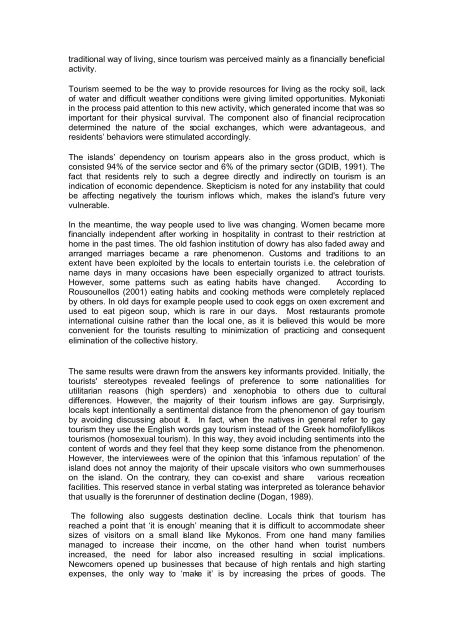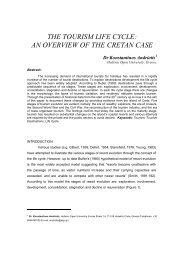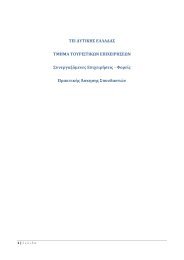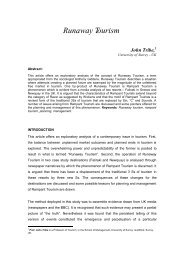Social Impacts of Tourism: Perceptions of Mykonos' City Residents.
Social Impacts of Tourism: Perceptions of Mykonos' City Residents.
Social Impacts of Tourism: Perceptions of Mykonos' City Residents.
You also want an ePaper? Increase the reach of your titles
YUMPU automatically turns print PDFs into web optimized ePapers that Google loves.
traditional way <strong>of</strong> living, since tourism was perceived mainly as a financially beneficial<br />
activity.<br />
<strong>Tourism</strong> seemed to be the way to provide resources for living as the rocky soil, lack<br />
<strong>of</strong> water and difficult weather conditions were giving limited opportunities. Mykoniati<br />
in the process paid attention to this new activity, which generated income that was so<br />
important for their physical survival. The component also <strong>of</strong> financial reciprocation<br />
determined the nature <strong>of</strong> the social exchanges, which were advantageous, and<br />
residents’ behaviors were stimulated accordingly.<br />
The islands’ dependency on tourism appears also in the gross product, which is<br />
consisted 94% <strong>of</strong> the service sector and 6% <strong>of</strong> the primary sector (GDIB, 1991). The<br />
fact that residents rely to such a degree directly and indirectly on tourism is an<br />
indication <strong>of</strong> economic dependence. Skepticism is noted for any instability that could<br />
be affecting negatively the tourism inflows which, makes the island's future very<br />
vulnerable.<br />
In the meantime, the way people used to live was changing. Women became more<br />
financially independent after working in hospitality in contrast to their restriction at<br />
home in the past times. The old fashion institution <strong>of</strong> dowry has also faded away and<br />
arranged marriages became a rare phenomenon. Customs and traditions to an<br />
extent have been exploited by the locals to entertain tourists i.e. the celebration <strong>of</strong><br />
name days in many occasions have been especially organized to attract tourists.<br />
However, some patterns such as eating habits have changed. According to<br />
Rousounellos (2001) eating habits and cooking methods were completely replaced<br />
by others. In old days for example people used to cook eggs on oxen excrement and<br />
used to eat pigeon soup, which is rare in our days. Most restaurants promote<br />
international cuisine rather than the local one, as it is believed this would be more<br />
convenient for the tourists resulting to minimization <strong>of</strong> practicing and consequent<br />
elimination <strong>of</strong> the collective history.<br />
The same results were drawn from the answers key informants provided. Initially, the<br />
tourists' stereotypes revealed feelings <strong>of</strong> preference to some nationalities for<br />
utilitarian reasons (high spenders) and xenophobia to others due to cultural<br />
differences. However, the majority <strong>of</strong> their tourism inflows are gay. Surprisingly,<br />
locals kept intentionally a sentimental distance from the phenomenon <strong>of</strong> gay tourism<br />
by avoiding discussing about it. In fact, when the natives in general refer to gay<br />
tourism they use the English words gay tourism instead <strong>of</strong> the Greek hom<strong>of</strong>il<strong>of</strong>yllikos<br />
tourismos (homosexual tourism). In this way, they avoid including sentiments into the<br />
content <strong>of</strong> words and they feel that they keep some distance from the phenomenon.<br />
However, the interviewees were <strong>of</strong> the opinion that this ‘infamous reputation’ <strong>of</strong> the<br />
island does not annoy the majority <strong>of</strong> their upscale visitors who own summerhouses<br />
on the island. On the contrary, they can co-exist and share various recreation<br />
facilities. This reserved stance in verbal stating was interpreted as tolerance behavior<br />
that usually is the forerunner <strong>of</strong> destination decline (Dogan, 1989).<br />
The following also suggests destination decline. Locals think that tourism has<br />
reached a point that ‘it is enough’ meaning that it is difficult to accommodate sheer<br />
sizes <strong>of</strong> visitors on a small island like Mykonos. From one hand many families<br />
managed to increase their income, on the other hand when tourist numbers<br />
increased, the need for labor also increased resulting in social implications.<br />
Newcomers opened up businesses that because <strong>of</strong> high rentals and high starting<br />
expenses, the only way to ‘make it’ is by increasing the prices <strong>of</strong> goods. The





